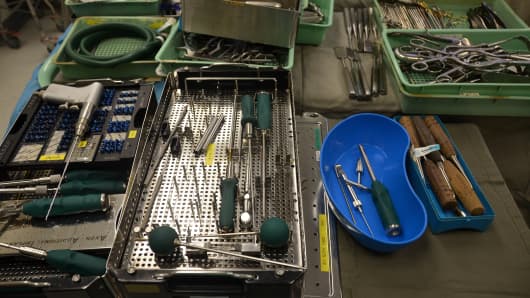Hideously Improbable
"[When the spine is cut, the neurons] cannot be reconnected, so it's scientifically impossible."
"Ethically it's impossible. How can you put one person's head on another's body?"
Dr. Huang Jiefu, (former) deputy minister of health, China
"For most people, it's at best premature and at worst reckless."
Dr. James L. Bernat, professor of neurology and medicine, Dartmouth College, Hanover, New Hampshire
"The Chinese system is not transparent in any way. I do not trust Chinese bioethical deliberation or policy. Add healthy doses of politics, national pride and entrepreneurship, and it is tough to know what is going on."
Arthur L. Caplan, medical ethicist, New York University
"I don't want to see China's scholars, transplant doctors and scientists deepening the impression that people have of us internationally, that when Chinese people do things they have no bottom line — that anything goes."
Cong Yali, medical ethicist, Peking University
"We see the reactions among Western commentators as a misunderstanding of the current situation."
"[Critics are unwilling to acknowledge China] as an equal partner in the international debate about proper limits to the development of new biotechnologies."
Zhai Xiaomei, dean, School of Humanities and Social Sciences, Peking Union Medical College
"At this stage, I would call the attempt stupid rather than crazy. Crazy means it may be done. Stupid should not be done."
"And using the gluelike substance, polyethylene glycol to facilitate the growth of nerve endings] Put it this way: It is like if the trans-Atlantic phone cable is cut by half, and someone wants to put it together using Krazy Glue."
Dr. Abraham Shaked, professor of surgery, director, Penn Transplant Institute, University of Pennsylvania
 |
Stefan Irvine | LightRocket | Getty Images Instruments for spinal surgery, photographed
in an operating theater. Chinese surgeon Ren Xiaoping is experimenting
with full-body transplants on mice and human cadavers, with a view to
using the technique on spine-injured patients
|
Of course, if the individual in question who may have doubts, but yet views such a surgery as their last best hope to continue living has no other option but to face death without such a hoped-for solution, it is the emotional attachment to life itself that instructs that person's decision-making. No one wants to face the permanence of the absence of life, becoming nothing, knowing nothing, fading into nothing.
And so it is with Wang Huanming, paralyzed six years earlier down from his neck. Who might have imagined that a bit of fun, wrestling with a friend, might have resulted in such a catastrophic bodily collapse. Mr. Huanming sees his only hope for a future in the possibility that a full-body transplant to permit him to resume life as he would normally have done without his accident, leading him to place his hope in a never-performed whole-body surgery.
And the surgeon who is prepared to undertake that history-making surgical procedure is Dr. Ren Xiaoping in Harbin, China. Dr. Ren is fully aware of the censure that is coming his way from the medical profession who view his plans as noxiously absurd, dangerously reckless, and philosophically dented. His country, on the other hand, likely is more than ready for him to proceed, when a success of this magnitude would burnish the country's reputation.
The rest of the world, sitting on the sidelines, tut-tutting in professional outrage, expects nothing less from China, only too willing to push the ethical and practical boundaries of science to enhance their reputation on the world stage -- for making the attempt, and possibly even the remote potential of succeeding in the attempt. Yet it isn't only Western medical professionals who have their doubts, but Chinese experts as well.
The extreme difficulty inherent in connecting nerves in the spinal cord represents the major stumbling block to success. Failure to succeed would result in the patient's swift death, rather more immediately than if the condition they were suffering was allowed to take its natural course. Mr. Wang is not the only volunteer; there are others in China who have also responded as body transplant volunteers in Harbin.
Dr. Ren of Harbin Medical University, has a surgical history in the United States, having been involved in the first hand transplant undertaken in 1999 there. And he is determined to proceed with his own very special breakthrough in surgery transplantation. So determined that he is busy putting together a surgical team, research is underway, and the operation is scheduled to take place "when we are ready".
His daunting plan of action is to remove two heads from two bodies, then connect the blood vessels of the body of a deceased donor with that of the recipient head during which procedure a metal plate is to be inserted stabilizing the new neck while the spinal cord nerve endings are bathed in a mucilage substance to hasten regrowth and to attach the skin back in place.
Dr. Ren has a rival for those aspirations, another surgeon, Dr. Sergio Canavero in Italy, advocating for the same type of scientific-medical breakthrough in transplant potentials. As well, scientists with the Institute of Theoretical and Experimental Biophysics at the Russian Academy of Sciences are also involved in investigating various aspects of the mechanical/biological process.
For Mr. Wang there is hope, as dim as it might seem to onlookers. His daughter Wang Zhi, 34, and her mother have been hand-pumpimg oxygen into his lungs for three years. Their care for him has been relieved somewhat with a new automatic pump, acquired through donations. But the medical bills associated with his care have left them paupers.
"He cannot live, and he cannot die", said his daughter. Mr. Wang's family echo his hope that if the surgery succeeds he will live, if it fails to triumph over his adversity, he will lose whatever life is left to him. "A medical procedure that sounds impossible may save us", his daughter explains simply.
Labels: Bioscience, China, Controversy, Health, Research

0 Comments:
Post a Comment
<< Home